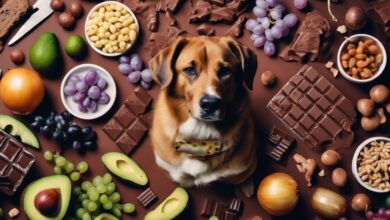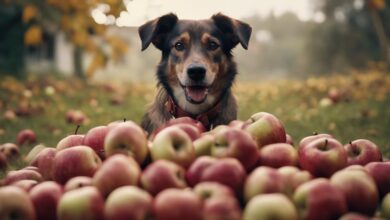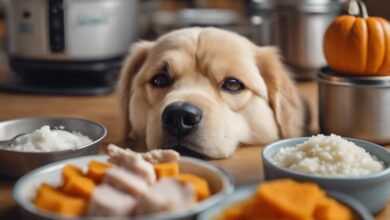How Many Cheez-Its Can Dogs Eat
If you're curious about the number of Cheez-Its your dog can consume, it's important to be cautious. Feeding too many could lead to digestive issues, weight gain, and behavioral changes due to high fat, salt, and additives. Consider factors like portion control, nutritional value, and your dog's size and health. Safely monitor for any signs of overfeeding, such as stomach problems, weight gain, or behavior alterations. Opt for healthier, vet-approved treat alternatives. Remember, your furry friend's well-being is the priority. Understanding these risks and tips guarantees a happy and healthy pup.
Key Takeaways
- Limit Cheez-Its due to high fat and salt content.
- Offer in moderation to prevent digestive issues.
- Consider dog's size and health when giving treats.
- Monitor for allergies or adverse reactions.
- Consult a vet for safe treat options and portion sizes.
Potential Risks of Feeding Cheez-Its to Dogs
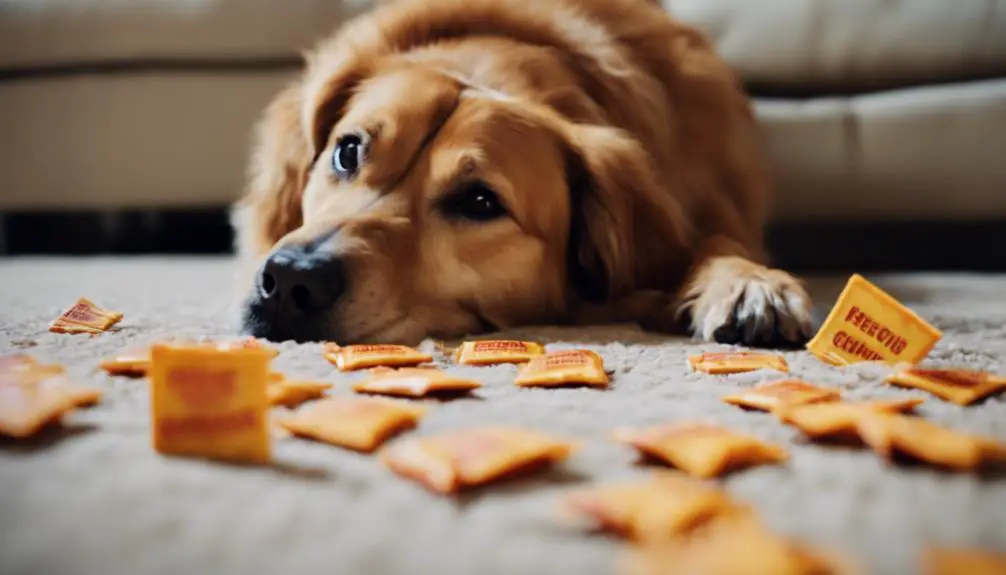
Feeding Cheez-Its to dogs can pose various risks to their health and well-being. These risks include digestive issues, weight gain, behavioral changes, and nutritional deficiencies. Cheez-Its are high in fat and salt, which can lead to digestive problems such as stomach upset, diarrhea, or pancreatitis in dogs. The high-calorie content in Cheez-Its can contribute to weight gain, potentially leading to obesity and related health issues. Additionally, the artificial additives and preservatives in Cheez-Its may cause behavioral changes in some dogs, affecting their mood or energy levels. Moreover, regularly feeding Cheez-Its to dogs can result in nutritional deficiencies since these snacks lack essential nutrients required for a balanced canine diet. It is important to be cautious and mindful of these potential risks before offering Cheez-Its to your furry companion.
Factors to Consider Before Feeding Cheez-Its
Before offering Cheez-Its to your furry companion, consider the potential impact on their health and well-being by evaluating key factors. Conduct an ingredient analysis to confirm the Cheez-Its do not contain harmful substances like garlic or onion, which can be toxic to dogs. Additionally, practice portion control to prevent overfeeding, as excessive consumption can lead to obesity and other health issues. Evaluate the nutritional value of Cheez-Its and compare it to your dog's dietary requirements to make sure they are receiving a balanced diet. Establish a feeding schedule that incorporates Cheez-Its as an occasional treat rather than a regular meal replacement. By carefully considering these factors, you can help safeguard your dog's health and happiness.
Recommended Serving Size for Dogs
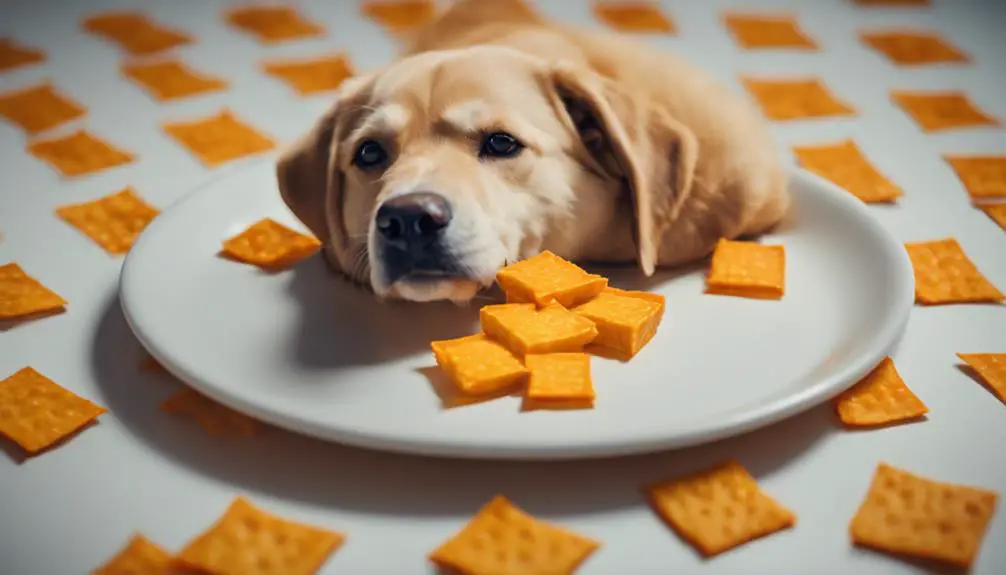
When considering the recommended serving size of Cheez-Its for dogs, it is crucial to prioritize their safety and well-being. Keep in mind dietary considerations, such as your dog's size, breed, and any underlying health conditions. Additionally, always monitor for any signs of allergies or adverse reactions after introducing Cheez-Its into your dog's diet.
Safe Portion Sizes
Make sure that you portion out your dog's treats according to their recommended serving size to maintain their health and well-being. When it comes to treating your furry friend, keeping an eye on portion control is essential. To help you understand the appropriate serving sizes, refer to the table below:
| Treat Type | Recommended Serving Size |
|---|---|
| Small Biscuits | 1-2 pieces |
| Dental Chews | 1 piece |
| Soft Treats | 1/2 – 1 inch piece |
Dietary Considerations
To guarantee your dog's well-being, adhere to the recommended serving sizes for their dietary needs, including Cheez-Its or any other treats. Maintaining a nutritional balance is vital for your dog's overall health. Treats like Cheez-Its should be given sparingly, considering their calorie content to manage your pet's weight effectively. Excessive treats can lead to weight gain and digestive issues. It's important to remember that treats should not replace a balanced diet tailored to your dog's specific requirements. Monitoring your dog's calorie intake from treats alongside their regular meals will help in weight management. Prioritizing your dog's digestive health by offering treats in moderation will contribute to their overall well-being.
Monitoring for Allergies
Regularly monitoring your dog's reaction to Cheez-Its and other treats is essential to determine the appropriate serving size that suits their individual dietary needs and potential allergies. Allergy testing can help identify any specific ingredients in Cheez-Its that may trigger adverse reactions in your furry friend. Prevention is key when it comes to managing allergies, so being important and observant is vital. Keep an eye out for symptoms such as itching, redness, swelling, vomiting, or diarrhea after your dog consumes Cheez-Its. If you notice any signs of discomfort or allergic reactions, consult your veterinarian promptly. Remember, each dog is unique, and understanding their dietary restrictions and sensitivities is fundamental for their well-being.
Signs of Overfeeding Cheez-Its to Dogs
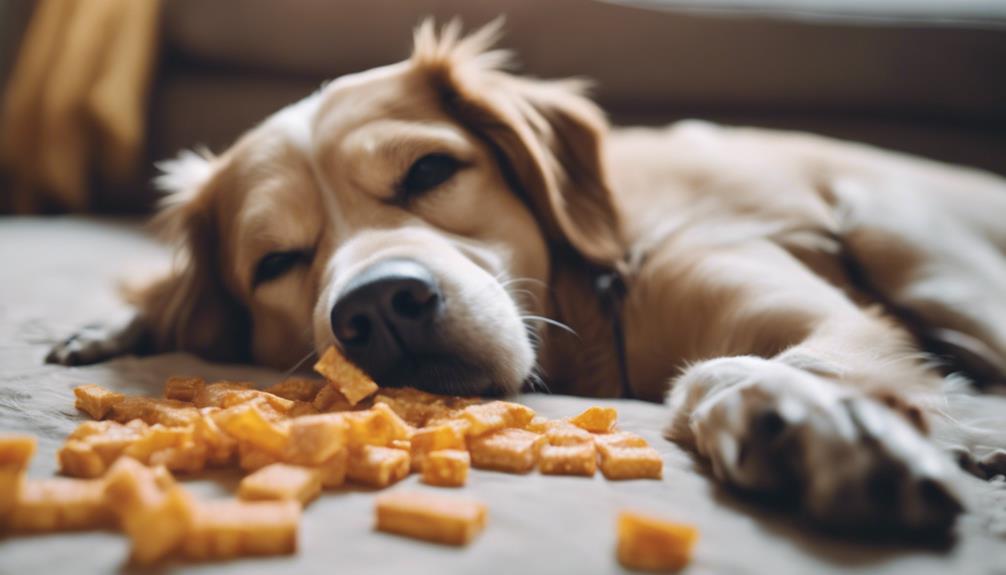
Overindulging your furry companion in Cheez-Its may lead to detrimental health consequences. Excessive consumption of Cheez-Its can result in various issues for your dog. Digestive problems such as stomach pain, vomiting, diarrhea, or constipation may arise due to the high-fat content and artificial ingredients in these snacks. Additionally, the calorie-dense nature of Cheez-Its can contribute to weight gain if fed in large quantities regularly. Behavioral changes, like hyperactivity or lethargy, could be observed in dogs that have consumed too many Cheez-Its. Furthermore, overfeeding Cheez-Its may lead to nutritional deficiencies as these snacks do not provide essential nutrients required for your dog's overall well-being. It is important to monitor your dog's Cheez-It intake to prevent these potential issues.
Health Implications of Excessive Cheez-Its Consumption
Feeding your dog excessive amounts of Cheez-Its can have serious health implications. Consuming too many Cheez-Its can lead to various issues that can affect your dog's well-being. Being mindful of the quantity and frequency of treats you provide to your furry friend is important to maintain their health.
- Digestive issues: Overindulgence in Cheez-Its can cause digestive problems like stomach upset, diarrhea, or constipation in dogs.
- Portion control: Controlling the amount of Cheez-Its your dog consumes is vital to prevent excessive calorie intake and potential health issues.
- Weight management, nutritional balance: Excessive Cheez-Its consumption can lead to weight gain, impacting your dog's overall health and requiring a careful balance of nutrients in their diet.
Safe Alternatives to Cheez-Its for Dogs

For your dog's health and well-being, consider incorporating safe alternatives to Cheez-Its in their diet. Homemade treats can be a great option, providing a tasty and healthy snack without the drawbacks of processed human foods like Cheez-Its. You can easily make homemade treats using ingredients like pumpkin, peanut butter, or sweet potato. These treats can be tailored to your dog's preferences and dietary needs. Additionally, using homemade treats as training rewards can be an effective way to reinforce positive behavior without the risks associated with feeding your dog Cheez-Its. By choosing safe alternatives like homemade treats for your furry friend, you can make sure they enjoy delicious snacks while maintaining their health and well-being.
Consulting a Veterinarian for Dietary Advice
Before making any changes to your dog's diet, it's important to consult with a veterinarian for personalized advice. Veterinarians can provide tailored dietary recommendations based on your dog's specific needs and health conditions. They can also help create customized meal plans and suggest healthy treat options to guarantee your furry friend stays happy and healthy.
Vet's Dietary Recommendations
When seeking dietary advice for your dog, it is highly recommended to consult a veterinarian for accurate and tailored recommendations. Veterinarians can provide valuable insights into your dog's specific nutritional needs and help you make informed decisions regarding their diet. Here are some key aspects to take into account when discussing dietary recommendations with your vet:
- Nutritional Supplements: Your vet may recommend specific supplements to address any deficiencies in your dog's diet.
- Homemade Recipes: If you are contemplating homemade meals for your dog, a vet can advise on balanced recipes to guarantee your dog receives all necessary nutrients.
- Special Dietary Needs: Vets can offer guidance on special diets for conditions like allergies, obesity, or other health issues.
Consulting a veterinarian ensures that your dog's dietary requirements are met effectively and safely.
Customized Meal Plans
Seeking advice from a veterinarian can assist in creating customized meal plans tailored to meet your dog's specific dietary needs effectively and safely. When developing a personalized meal plan for your furry companion, it is important to focus on achieving nutritional balance through proper portion control. A veterinarian can recommend ingredient quality standards to guarantee your dog receives the necessary nutrients for peak health. Additionally, meal variety is essential to prevent nutrient deficiencies and offer a range of flavors and textures for your dog to enjoy. By consulting a professional, you can address any specific dietary concerns or health conditions your dog may have, leading to a well-rounded and tailored meal plan that supports their overall well-being.
Healthy Treat Options
To guarantee your dog's dietary needs are met, consulting a veterinarian for advice on healthy treat options is essential for maintaining their overall well-being. When considering healthy treats for your furry friend, the following options are recommended:
- Homemade treats: Creating treats at home allows you to control the ingredients, ensuring they are safe and nutritious for your dog.
- Nutritious snacks: Opt for snacks that are high in protein and low in additives or preservatives to support your dog's health.
- Consult with your veterinarian: Seek guidance from a professional to tailor treat options to your dog's specific dietary requirements and health conditions.

If Richie Bedard is a dog food expert, author, or any other figure in the field of dog nutrition that emerged after September 2021,

